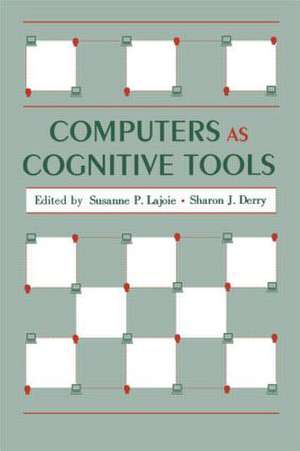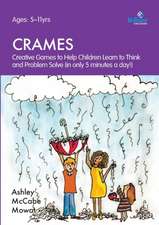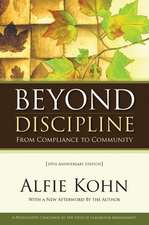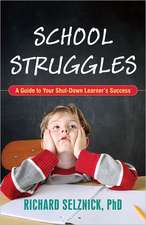Computers As Cognitive Tools: Technology and Education Series
Editat de Susanne P. Lajoie, Sharon J. Derryen Limba Engleză Paperback – iun 1993
An evident trend is that researchers in both "camps" view their computer learning environments as "cognitive tools" that can enhance learning, performance, and understanding. Cognitive tools are objects provided by the instructional environment that allow students to incorporate new auxiliary methods or symbols into their social problem solving which otherwise would be unavailable. A final section of the book represents researchers who are assimilating and accommodating the wisdom and creativity of their neighbors from both camps, perhaps forming the look of technology for the future. When the idea of model tracing in a computer-based environment is combined with appreciation for creative mind-extension cognitive tools and for how a community of learners can facilitate learning, a camp is created where AI technologists and social constructivist learning theorists can feel equally at home.
| Toate formatele și edițiile | Preț | Express |
|---|---|---|
| Paperback (1) | 447.16 lei 6-8 săpt. | |
| Taylor & Francis – iun 1993 | 447.16 lei 6-8 săpt. | |
| Hardback (1) | 960.35 lei 6-8 săpt. | |
| Routledge – 12 iul 2000 | 960.35 lei 6-8 săpt. |
Preț: 447.16 lei
Preț vechi: 526.07 lei
-15% Nou
Puncte Express: 671
Preț estimativ în valută:
85.57€ • 88.41$ • 71.18£
85.57€ • 88.41$ • 71.18£
Carte tipărită la comandă
Livrare economică 19 martie-02 aprilie
Preluare comenzi: 021 569.72.76
Specificații
ISBN-13: 9780805810820
ISBN-10: 080581082X
Pagini: 410
Dimensiuni: 152 x 229 x 28 mm
Greutate: 0.54 kg
Ediția:1
Editura: Taylor & Francis
Colecția Routledge
Seria Technology and Education Series
Locul publicării:Oxford, United Kingdom
ISBN-10: 080581082X
Pagini: 410
Dimensiuni: 152 x 229 x 28 mm
Greutate: 0.54 kg
Ediția:1
Editura: Taylor & Francis
Colecția Routledge
Seria Technology and Education Series
Locul publicării:Oxford, United Kingdom
Public țintă
ProfessionalCuprins
Contents: S.J. Derry, S.P. Lajoie, A Middle Camp for (Un)Intelligent Instructional Computing: An Introduction. Part I:Model Builders. K.R. Koedinger, J.R. Anderson, Reifying Implicit Planning in Geometry: Guidelines for Model-Based Intelligent Tutoring System Design. V.J. Shute, A Comparison of Learning Environments: All That Glitters... M.R. Lepper, M. Woolverton, D.L. Mumme, J-L. Gurtner, Motivational Techniques of Expert Human Tutors: Lessons for the Design of Computer-Based Tutors. S.J. Derry, L.W. Hawkes, Local Cognitive Modeling of Problem-Solving Behavior: An Application of Fuzzy Theory. Part II:Non-Modelers. K. Reusser, Tutoring Systems and Pedagogical Theory: Representational Tools for Understanding, Planning, and Reflection in Problem Solving. G. Salomon, On the Nature of Pedagogic Computer Tools: The Case of the Writing Partner. R. Lehrer, Authors of Knowledge: Patterns of Hypermedia Design. S.D. Teasley, J. Roschelle, Constructing a Joint Problem Space: The Computer as a Tool for Sharing Knowledge. Part III:Bridging Differences in Opposing Camps. S.P. Lajoie, Computer Environments as Cognitive Tools for Enhancing Learning. S. Katz, A. Lesgold, The Role of the Tutor in Computer-Based Collaborative Learning Situations. L. Schauble, K. Raghavan, R. Glaser, The Discovery and Reflection Notation: A Graphical Trace for Supporting Self-Regulation in Computer-Based Laboratories. Part IV:Discussants. S.F. Chipman, Gazing Once More Into the Silicon Chip: Who's Revolutionary Now? A. Lesgold, Information Technology and the Future of Education.
Recenzii
"This book will be a valuable resource to researchers and educators at all levels who are interested in statistical problem solving, how students best learn statistics, and how to assess student progress in statistics.
—Teaching Children Mathematics
—Teaching Children Mathematics
Notă biografică
Susanne P. Lajoie, Sharon J. Derry
















